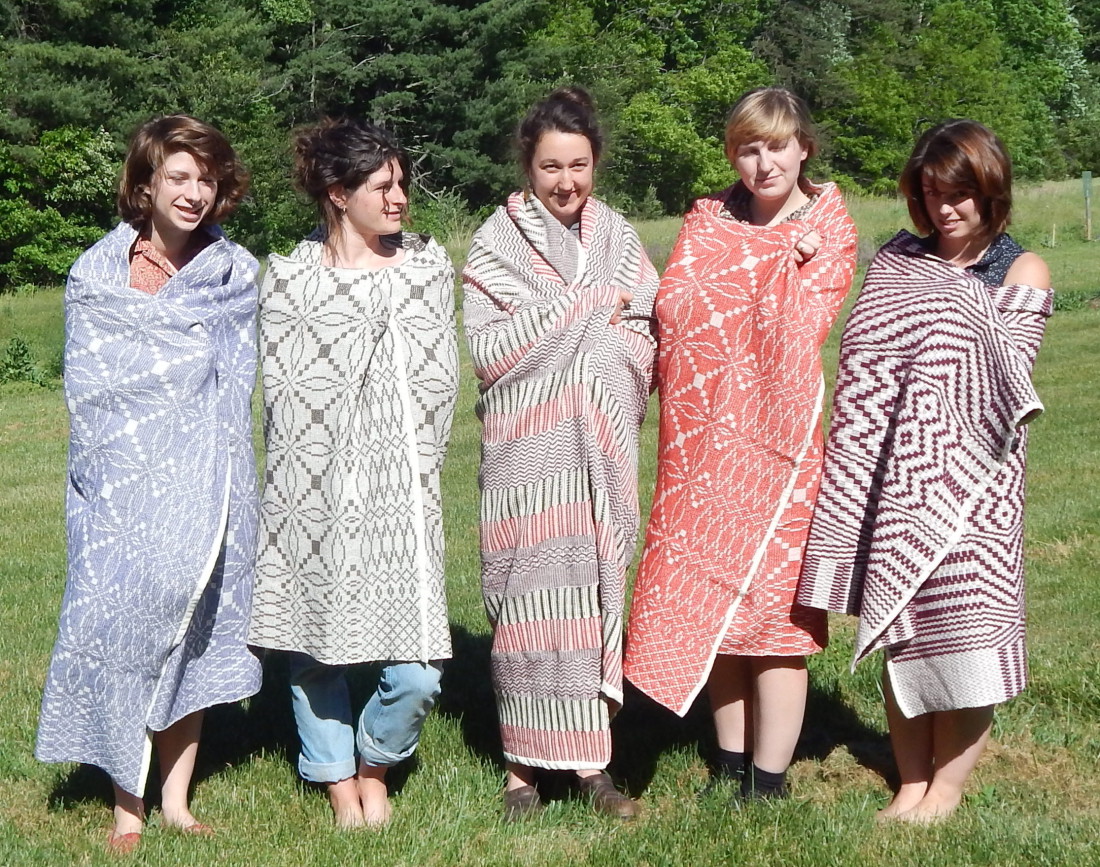“I don’t know where fiber art will lead me next, but I am energized and inspired to keep exploring,” says Selinde Lanier, a textile artist based in Madison County. Lanier is one of the member artists of Flow Gallery in Marshall, which will be celebrating American Craft Week with an exhibition themed around the concept of surface. “I plan to exhibit three new pieces exploring the idea of fabric as skin, the surface of ourselves,” says Lanier.
Last year’s exhibition during American Craft Week won Flow Gallery a national award for the most innovative event concept. The showing included seven weavings by Lanier, inspired by seven scents developed by Katie Vie, an aromatherapist and Flow Gallery member artist.
Similar to the way that a musician might get comfortable by playing cover tunes, Lanier began her practice as a studio fiber artist by connecting to the region’s roots, using traditional coverlet patterns as a starting point for her designs. She came to studio work in 2007 following a 2004 layoff due to the downsizing of the commercial textile design industry.
“[It] can be so freeing as to be almost terrifying,” Lanier says of the transition from commercial work to a studio practice. “The box you work in becomes four walls, and you find yourself in there alone, with nothing but yourself and your tools to keep you company.” To facilitate the creative process, she constructed self-imposed guidelines. “Those phenomenal patterns produced by mountain weavers 100 years ago or more provided the box I was used to having to work within,” she says.
Before her industry job and before her studies, Lanier’s textile trajectory began with the realization that the material’s seemingly old-fashioned forms could be reinterpreted. This was demonstrated by the women weavers at the Bauhaus school in Germany during the early 1900s, whose work suggested “the empowering potential of weaving as a mode of expression,” says the artist. In recent years, Lanier continues to work on the loom, but also incorporates felting, embroidery and burnout, a chemical process to create a semitransparent pattern. “I consider myself quite fortunate to still be doing this at all, given the economics of global textile production,” she says.
Meanwhile, the organization Local Cloth is working to build the case that the area’s textile arts and local fiber production are positioned for economic growth. An exhibition titled Connections, on display at the Asheville Area Arts Council through Saturday, Oct. 31, shows the results of partnerships between local fiber farmers and artists. All works on display include at least some local material components.
Kitty Love, director of the arts council, says the exhibit is “absolutely beautiful and tactile in the extreme.” But the show’s thesis goes beyond the visual display. “As the AAAC moves deeper into making a case for the economic power of arts and culture, fiber arts represents a relevant case study,” says Love.
Local Cloth was founded in 2012 by Judi Jetson, formerly of HandMade in America, who says that the region has “more fiber artists per capita than anyplace else in the U.S.” The numbers loom large — the organization cites that within a 100-mile radius from Asheville, there are 405 professional fiber artists, 2,500 fiber art hobbyists, 83 textile-related retail outlets, 462 fiber animal farms, 21 cotton farms, 12 textile mills and seven learning institutions.
This fall, the Local Cloth website will offer a directory of the area’s fiber resources. “There is a growing international demand for sustainably produced textiles, especially clothing, and our region is rich in resources to meet this demand,” says Jetson.
One of the area’s resources, the fiber program at Haywood Community College, has seen an increase of out-of-state students moving to the area specifically for the program, says director Amy Putansu. “Not only are textiles practical, textiles root us in history, connecting us to one another locally and globally.”
In conjunction with American Craft Week, an exhibition of the 2015 Haywood graduates in Professional Craft Studies will be on display at the school. It runs through Tuesday, Dec. 8, and was also exhibited this summer at the Folk Arts Center. Despite being just a two-year course of study at a community college, Haywood’s fiber program remains competitive with national four-year schools. The Dendel Scholarship of the Handweavers Guild of America, a national award, was captured by Haywood’s students in 2012, 2013 and 2015. This year’s winner is Diane Ardanowski of Asheville.
“I have become ever more passionate about the relevance of textiles in our lives today and throughout history,” Putansu says. Both she and Local Cloth members have compared the area’s fiber supply chain to the local foods movement. “There is a growing appreciation for handcrafted beer and food ingredients and understanding the supply chain,” says Putansu. “This attitude is beginning to permeate all areas of lifestyle, including the clothing we wear and the fabrics we surround ourselves with.”




Before you comment
The comments section is here to provide a platform for civil dialogue on the issues we face together as a local community. Xpress is committed to offering this platform for all voices, but when the tone of the discussion gets nasty or strays off topic, we believe many people choose not to participate. Xpress editors are determined to moderate comments to ensure a constructive interchange is maintained. All comments judged not to be in keeping with the spirit of civil discourse will be removed and repeat violators will be banned. See here for our terms of service. Thank you for being part of this effort to promote respectful discussion.